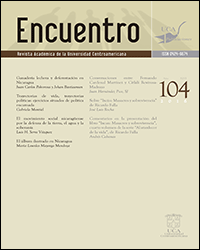Life Trajectories, Political Trajectories: Situated Exercises of Embodied Politics
DOI:
https://doi.org/10.5377/encuentro.v0i104.2860Keywords:
body art, politicsAbstract
This article is an invitation to rethink politics and the political, placing bodies as a pattern of enunciation. Corporalities do not shape themselves alone, power discourses (order, nourishment, beauty, desire, mobility, agency, subordination, repression) break through them. We constructed this thesis through life narrative, hand in hand with the Biographic Method (Sautu, 2004), with Situated Knowledge’s (Haraway, 1989) proposal for feminist research, and theoretically we followed on the footsteps of Decolonial Feminisms regarding their analysis of political identities and social movements (Flórez, 2010), and Transfeminism (Álvarez Castillo, 2014; Preciado, 2013; Solá, 2013; Sentamans, 2013). What does incarnating politics imply? Answering this question is the objective of this dialogue between three fellow artists and myself, positioning this situated body as the main pattern of enunciation.Downloads
Download data is not yet available.
Abstract
1848
1848
PDF (Español (España)) 4286
Downloads
Published
2016-09-07
How to Cite
Montiel, G. (2016). Life Trajectories, Political Trajectories: Situated Exercises of Embodied Politics. Encuentro, (104), 29–37. https://doi.org/10.5377/encuentro.v0i104.2860
Issue
Section
Articles
License
All published articles are licensed under the Creative Commons (BY, NC, SA), in the following terms: no commercial use of the original work or any derivative works, distribution of which must be done with a license equal to that which regulates the original work. This does not condition that the authors maintain their rights without restrictions. The journal allows authors to retain publication rights without restrictions.

Encuentro is licensed under a Creative Commons Attribution-NonCommercial-ShareAlike 4.0 International License.

